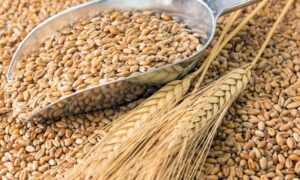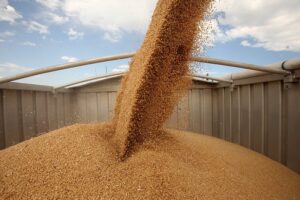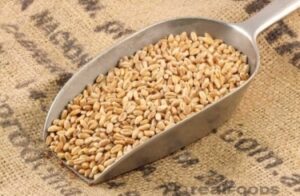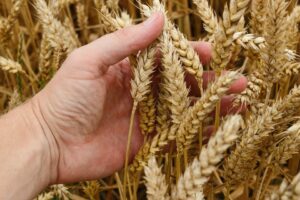
DTEK Group’s trading company D.Trading, which operates in the electricity, gas and coal markets, is launching grain trading, said Dmitry Malyar, CEO of the company.
“The first deal concluded on the domestic market opens a new page in the company’s history. The first thousand tons have been shipped to a customer. This is the company’s first practical step in a new trading direction,” Malyar wrote on Facebook on Tuesday.
He clarified that D.Trading’s agricultural office is already operating in Odesa.
“We will provide new market opportunities for agricultural producers and work on developing export potential,” Malyar said.

This year, Ukrainian agrarians grew 81 million tons of gross grain harvest, which is 5-6% of global production, said Mykola Gorbachev, President of the Ukrainian Grain Association (UGA).
“Ukraine is located on such soils that we depend on weather factors more than on technology. Although technologies in Ukraine have advanced over the past 20-30 years, and we have grown 100 million tons of grain, which we used to grow 30 million tons. This year, we were lucky with the weather – yields for all crops were above average. We got a record yield for each of the crops,” he said at the Business Breakfast with Forbes Ukraine on Wednesday.
According to the UGA president, this allowed the country to compensate for the loss of 6 million hectares of arable land that is currently under occupation and on the front line and is not cultivated by farmers.
“The world produces more than 2.5 billion tons of grain, of which Ukraine has grown more than 80 million tons this year. If we look at grain trade in absolute terms, Ukraine accounts for about 5-6%. This is a serious impact (on the global market – IF-U),” Gorbachev emphasized, adding that this share of grain production does not allow Ukraine to control the global market.
He reminded that farmers do not depend on the volume of production, but on the prices for it, and expressed hope that the 2023-2024 marketing year will allow for further equalization of world prices and Ukrainian farmers will not be at a loss.
As reported, this season winter wheat plantings amounted to 4166 thou hectares (-834 thou hectares compared to the previous season), winter barley – 536 thou hectares (-255 thou hectares), and rapeseed – 1374 thou hectares (+110 thou hectares).
According to the adjusted forecast of the Ministry of Agrarian Policy, in 2023, farmers will be able to harvest 79.1 mln tons of grains and oilseeds, including 57.5 mln tons of grains and 21.6 mln tons of oilseeds.
On November 3 this year, the UGA updated its estimate of the potential harvest in 2023, increasing it to 81.6 mln tonnes of grains and oilseeds, which is 10.6% more than in 2022, when 73.8 mln tonnes were harvested.

In January-October 2023, Ukrzaliznytsia JSC (UZ) increased the volume of grain and milling products transportation by 5.8%, or 1.32 mln tonnes compared to the same period of 2022, to 24.26 mln tonnes, according to the UZ report.
According to the document, 17.55 mln tons of grain and milled products were transported in export traffic in 10 months, which is 0.7% or 129 thsd tonnes less compared to the same period of 2022.
In total, 10.46 mln tons of grain cargo were transported by rail to ports in 10 months, which is 15% less than in the same period of 2022. At the same time, the volume of transportation in the direction of border crossings amounted to 7.09 mln tonnes (31% more).
The volumes of grain cargo transportation to ports have been growing since August, due to the launch of the temporary sea corridor to the ports of Greater Odesa, UZ said.
It is specified that in October, the share of grain transportation towards ports amounted to 56.8%.
Earlier it was reported that 151 vessels have used the Ukrainian sea corridor established by the Ukrainian Navy since August 10, 2023, 121 of which have already used it with 4.4 mln tons of export cargo.
According to the forecast of Yuriy Vaskov, Deputy Minister of Communities, Territories and Infrastructure Development, if the sea corridor is fully operational, more than 50% of export shipments in 2024 will be carried out by sea.

Based on the results of the analysis of export operations with agricultural products, BES analysts found that over 9 months, risky enterprises exported grain of unknown origin for UAH 133.9 billion. This is more than 20% of the total amount.
Currently, the Bureau of Economic Security has submitted its proposals to the Cabinet of Ministers of Ukraine to minimize risks in this sector of the economy.
One of the most common methods of “black” grain exports is the use of risky enterprises. They are set up in advance to export unaccounted-for grain purchased for cash.
In other words, farmers grow grain and sell it for cash to companies that are usually registered to front companies and do not engage in regular business activities.
These companies do not submit documents on the origin of the grain or declare fictitious producers in their customs declarations.
After the grain leaves Ukraine, it is resold several times and then legally reaches the final buyer. As a result, foreign currency earnings do not return to Ukraine, and the budget does not receive any revenues, as the exporting companies are fictitious.
Usually, the final buyer of grain is a non-resident company that transfers the money for the goods to another non-resident company related to a Ukrainian exporter.
There is also a scheme in which foreign currency is transferred to the current accounts of a non-resident, who then buys the goods, for example, in China and imports them to Ukraine to sell them for cash and to give other companies a tax credit.
To counteract offenses in this area, employees of the Economic Security Bureau constantly analyze export operations. Based on the results of such analysis, 43 analytical products and certificates were created, and almost 4,500 orders to initiate inspection (re-inspection) of goods were sent to the State Customs Service. For example, according to the BES in Odesa region, the customs office refused to clear 75 customs declarations totaling 1.6 million tons worth more than $430 million.
As part of 22 criminal proceedings, BES detectives served notices of suspicion to 12 officials of “risky” grain exporters for committing crimes under Articles 212 and 205-1 of the Criminal Code of Ukraine, conducted 71 searches, and sent 12 criminal proceedings to court. The courts have issued 8 indictments.

Since the beginning of the Russian aggression, Ukraine has been forced to change the geography of agricultural exports, as a result of which the share of Europe reached 59% in January-October 2023 compared to 32% in 2021, the Ukrainian Agribusiness Club (UCAB) reported on Facebook.
According to the report, such an increase in exports of agricultural products to Europe is forced and is explained by a decrease in supplies to other regions: the share of Africa decreased to 7% from 14%, Asia – to 12% from 19%, and Southeast Asia – to 4% from 13%.
“The main reason for these changes is the blockade of Ukrainian seaports by Russian troops. The development of alternative routes, which were possible only through the territory of the EU countries, led to changes. Ukrainian farmers were forced to look for buyers of their products in Europe,” the analysts explained.
The UCAB reminded that deliveries to Africa and Asia during the war became possible only thanks to the work of the grain corridor in cooperation with the UN and Turkey, as well as the temporary grain corridor, which is currently shipping.
In 2023, the structure of exports of Ukrainian agricultural products in terms of the main export items is similar to last year’s figures: 39% were grains, 26% were vegetable oils, 4% were meat, and 2% were dairy products, eggs, and honey. At the same time, exports of oilseeds decreased to 12% compared to 16% in 2022, while exports of oilcake increased to 6% from 5% during the year. The permission to supply sugar to foreign markets allowed producers to increase its share in agricultural exports to 3% over the year.
In pre-war 2021, the structure of Ukraine’s agricultural exports was as follows: cereals – 45%, vegetable oils – 26%, oilseeds – 9%, meals – 6%, meat – 3%, and tobacco products – 2%.
“The only way to resume exports to Ukraine’s traditional markets is to ensure the safety of sea export routes and increase the volume of shipments through this channel,” the UCAB summarized.